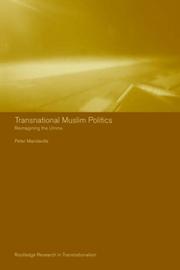| Listing 1 - 9 of 9 |
Sort by
|

ISBN: 9780415326070 9780415326063 0415326060 0415326079 9780203358511 0203358511 Year: 2007 Publisher: London : Routledge,
Abstract | Keywords | Export | Availability | Bookmark
 Loading...
Loading...Choose an application
- Reference Manager
- EndNote
- RefWorks (Direct export to RefWorks)
Introduction: thinking about Islam and politics in global perspective -- Islam and politics: history and key concepts -- State formation and the making of Islamism -- Islam in the system: the evolution of Islamism as political strategy -- Islam as the system: Islamic states and Islamization from above -- Islam for lack of a system: Islamism in weak and failed states -- Radical Islamism and jihad beyond the nation-state -- Muslim transnationalism: brotherhoods, networks diasporas -- Who speaks for Islam? religious authority in the global Umma -- Beyond Islamism: globalization and Muslim politics -- Appendix: key economic & political indicators for Muslim countries
Islam and politics. --- Islam and international relations --- Islam et politique --- Islam et relations internationales --- Islam and politics --- Islam and state --- Globalization --- Ummah (Islam) --- Religious aspects --- Islam --- Islam and state. --- Islam. --- -Ummah (Islam) --- 320.557 --- Umma (Islam) --- Global cities --- Globalisation --- Internationalization --- International relations --- Anti-globalization movement --- Mosque and state --- State and Islam --- State, The --- Politics and Islam --- Political science --- -Islam --- Political aspects --- Ummah (Islam). --- Globalization - Religious aspects - Islam

ISBN: 0415246946 041531769X 0415248946 9780415317696 9780203453155 9781134540181 9781134540228 9781134540235 9780415246941 Year: 2006 Volume: 2 Publisher: London Routledge
Abstract | Keywords | Export | Availability | Bookmark
 Loading...
Loading...Choose an application
- Reference Manager
- EndNote
- RefWorks (Direct export to RefWorks)
Globalization --- Islam and politics --- Islam and state --- Ummah (Islam) --- Islam --- Politics --- Religious aspects --- #A0511PSA --- Islam and politics. --- Islam and state. --- Islam et politique --- Mondialisation --- Islam et Etat --- Islam. --- Aspect religieux
Book
ISBN: 0197605834 0197605818 0197605826 Year: 2023 Publisher: New York, NY : Oxford University Press,
Abstract | Keywords | Export | Availability | Bookmark
 Loading...
Loading...Choose an application
- Reference Manager
- EndNote
- RefWorks (Direct export to RefWorks)
'The Geopolitics of Religious Soft Power' represents a globally comparative study of the varying ways in which states incorporate religion and religious outreach into their external relations. Each chapter demonstrates how the history, religious culture, and geopolitical orientation of a particular country determines its capacity for using religion as part of a soft power strategy while simultaneously dictating the nature and shape of its religious outreach activities, its intended audiences, and likelihood of success or impact.
Religion and international relations. --- Diplomacy --- Geopolitics --- Religious aspects. --- Soft power (Political science) --- Religion. --- Religion & beliefs.
Book
Year: 2001 Publisher: London: Routledge,
Abstract | Keywords | Export | Availability | Bookmark
 Loading...
Loading...Choose an application
- Reference Manager
- EndNote
- RefWorks (Direct export to RefWorks)
Globalization --- Islam and politics --- Islam and state --- Ummah (Islam)
Book
ISBN: 0197532608 0197532586 0197532594 9780197532591 9780197532560 Year: 2022 Publisher: Oxford Oxford university press
Abstract | Keywords | Export | Availability | Bookmark
 Loading...
Loading...Choose an application
- Reference Manager
- EndNote
- RefWorks (Direct export to RefWorks)
For more than half a century, Saudi Arabia--through both official and non-governmental channels--has poured billions of dollars into funding and sponsoring religious activities and Islamic causes around the world. The effect has been to propagate Wahhabism, the distinctively rigid and austere form of Islam associated with the Kingdom's religious establishment, within Muslim communities on almost every continent. This volume features essays by leading scholars who explore the origins and evolution of Saudi religious transnationalism, assess ongoing debates about the impact of these influences in various regions and localities around the world, and discuss possible future trends in light of new Saudi leadership. In addition to chapters devoted to the major actors and institutions involved in Saudi global religious propagation, the volume contains a wide range of country case studies that offer in-depth analysis of the nature and impact of Saudi religious influence in nations across multiple world regions.
Book
ISBN: 9781849041850 9781849041751 184904175X 1849041857 Year: 2012 Publisher: London: Hurst and company,
Abstract | Keywords | Export | Availability | Bookmark
 Loading...
Loading...Choose an application
- Reference Manager
- EndNote
- RefWorks (Direct export to RefWorks)
Transnationalism --- Political participation --- Emigration and immigration law --- Transnational voting
Book
Year: 2017 Publisher: Washington, DC : United States Institute of Peace,
Abstract | Keywords | Export | Availability | Bookmark
 Loading...
Loading...Choose an application
- Reference Manager
- EndNote
- RefWorks (Direct export to RefWorks)
Radicalism --- Prevention. --- Religious aspects.
Book
Year: 2021 Publisher: Washington, DC : United States Institute of Peace,
Abstract | Keywords | Export | Availability | Bookmark
 Loading...
Loading...Choose an application
- Reference Manager
- EndNote
- RefWorks (Direct export to RefWorks)
Peace-building --- Freedom of religion. --- Engagement (Philosophy) --- Religious aspects.
Book
ISBN: 0833089854 9780833089854 0833085751 9780833085757 Year: 2014 Publisher: Santa Monica, CA Rand Corporation
Abstract | Keywords | Export | Availability | Bookmark
 Loading...
Loading...Choose an application
- Reference Manager
- EndNote
- RefWorks (Direct export to RefWorks)
The United States faces a unique set of challenges and opportunities in strengthening security and justice sector partnerships in the Middle East and North Africa. Against the backdrop of the Arab uprisings, the U.S. government has issued policy guidance relating to foreign assistance more broadly and security sector assistance in particular. RAND researchers analyzed potential new partnership models that could help implement this guidance, simultaneously strengthening security and justice sector cooperation and promoting reform across the Arab world and beyond. They devised the Enhanced Partnership Planning Model, which focuses on improving collaborative planning, rather than on using assistance as leverage to require partner nations to do what the United States wants. The model serves as a flexible framework that could support tailored, rigorous SJS planning by U.S. and partner nation stakeholders. This framework can support both policy-makers and program managers as they seek to implement new policy guidelines that integrate elements of accountability and reform while continuing to advance core U.S. interests and equities in a rapidly evolving regional context.
Military assistance, American --- Political planning --- Security Assistance Program --- Arab Spring, 2010 --- -Military & Naval Science --- Law, Politics & Government --- Armies --- Arab Awakening, 2010 --- -Planning in politics --- Public policy --- American military assistance --- -Economic assistance, American --- Security, International --- Planning in politics --- Planning --- Policy sciences --- Politics, Practical --- Public administration --- -Military assistance, American
| Listing 1 - 9 of 9 |
Sort by
|

 Search
Search Feedback
Feedback About UniCat
About UniCat  Help
Help News
News